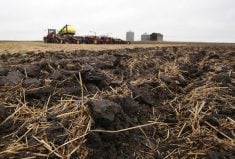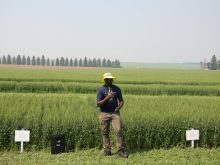Federal agriculture minister Marie-Claude Bibeau says she wants to set the record straight on the government’s fertilizer emissions reduction goal.
“There is a lot of misinformation going on right now,” she said in an Aug. 9 interview.
“I just wanted to reiterate that we’re really talking about reducing emissions caused by fertilizer. We’re not talking about having any intention of limiting the use of fertilizer itself. The idea is to use them in the most sustainable way possible.”
Read Also

Canadian Food Inspection Agency extends chronic wasting disease control program consultation deadline
Date extended for consultation period of changes to CWD program
The minister said the 30 percent reduction by 2030 is a voluntary target, not a mandate, and the notion put forward by some Conservatives and others that the federal government will implement a ban on fertilizer use is false.
“It’s not true. We have always said that this is a voluntary target,” she said. “We want to be ambitious because we have to move the needle. If we send the message that business as usual is good enough, it’s not.”
Consultations on the target opened in March and conclude at the end of August, and Bibeau said it’s important that everyone participate. She is in constant contact with farm organizations and stakeholders to be sure “the way we move forward is really taking into consideration the real world in which we are living.”
Her department has invested in programs to help farmers reduce emissions, including financial contributions toward better equipment and technology. She said the government will be alongside farmers in the transition to more sustainable practices as they develop.
“We want them to be sustainable, and sustainable means economically sustainable as well,” she said.
Farmers win if they follow practices such as 4R because they might not have to use as much fertilizer, obtain better soil health, reduce their input costs and reduce emissions, she said.
The government has announced $1.5 billion worth of agri-environmental spending as part of its record $4 billion budget this year. Bibeau said programs such as the living labs will help develop practices across the country that consider the different regions.
She also pointed out the government has invested in the fertilizer sector to help it develop more sustainable production methods, too.
The two objectives of reducing emissions and feeding the world in a sustainable way are not opposed to each other, Bibeau said.
Some have expressed concern about the 2030 date linked to the emissions reduction goal.
“I think when we have a target, we need a date. If we don’t, the target doesn’t mean anything anymore,” she said.
Bibeau said she is confident research and innovation will result in new practices and technology to help meet the target. These will be integrated into the measurements as they are adopted.
She also said industry is already working on emissions reduction on its own. For example, grain and dairy farmer organizations both have plans for zero emissions by 2050.
Contact karen.briere@producer.com
















